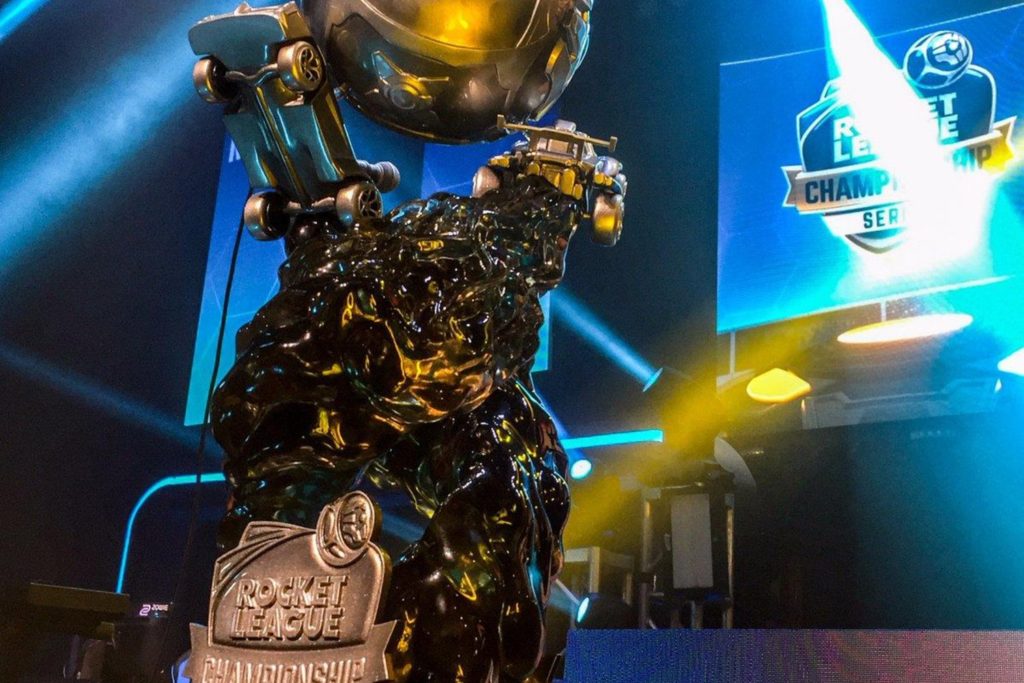- Rocket League, a game where sports meet cars, is holding the third season of its championship series June 2-4 in Los Angeles.
- Rocket League developer Psyonix is attracting non-endemic brands like Brisk, Mobil 1, 7-Eleven and Old Spice to esports.
- Twitch partnership has solidified Rocket League as a legitimate esport.
Over the past three years, developer Psyonix and Twitch have partnered to bring brands like Brisk, Mobil 1, 7-Eleven and Old Spice into the Rocket League, which is holding the third season of its championship series June 2-4 at The Wiltern Theater in Los Angeles.
“Our non-endemic sponsors have been excellent partners during the Rocket League Championship Series (RLCS), with Mobil 1 joining this season for its second consecutive year and 7-Eleven, Brisk and Old Spice jumping in for their first year,” Robin Allemand, Rocket League program manager at Twitch, told AListDaily. “7-Eleven and Brisk are giving fans exactly what they want—more RLCS-level gameplay—by creating three one-off $5,000 tournaments during the summer. Beyond their attractive prize pools, the tournaments will act as a connector between Seasons 3 and 4 (one per month in June, July and August) so that fans can track their favorite teams’ progress heading into the qualifiers for Season 4.”
Allemand said RLCS attracts an audience comprised of all ages, from kids under the age of 10 to adults 50 and above. However, the core age range is between 15 to 29 years old. “The quick games, exciting gameplay and easy-to-understand rules make Rocket League especially accessible for all ages,” Allemand said.
Josh Watson, head of esports at Psyonix, believes Rocket League is the perfect property for brands and sponsors interested in entering the esports market.
“For even the most casual viewer the game is exciting, fast-paced, and easy to understand,” Watson said. “You couple this with the non-violent gameplay and community focus and it is a great fit for our partners. We are very excited that we have seen so much interest in the game from brands outside of the traditional esports sponsors.”
Watson has watched Rocket League rapidly evolve into one of the most exciting new properties in esports. “We’ve seen the sport grow exponentially over the last year, and it is only getting bigger from here,” Watson told AListDaily. “Our goal for the Rocket League Championship Series has been to set the standard for new esports properties, and we think we’re on the right track. With the addition of a new region, more teams and more stability this season, we are looking to continue pushing the property forward. Outside of the premier league, we have a lot of other Rocket League esports initiatives on the way, including collegiate esports and more major events for our players.”
One reason for this growth is the addition of an esports button in the game, something other publishers are having success with, like Activision with Call of Dutyare using with success.
“Attracting the audience is one thing, but engaging viewers is something that is often forgotten,” Watson added. “We’ve always tried new and innovative ways to engage our viewers, like the community-driven Midseason Mayhem in the RLCS, where the viewers get to decide how the best players in the world compete. This season we’ve also created RLCS Overtime, a new weekly talk show that goes in-depth into the action and analyzes the sport as a whole. We also have some new exciting things coming up to continue to engage our growing fan base, so keep an eye out for more on that in the coming weeks and months.”
This year’s World Championship has expanded thanks to the new Oceania region, which has resulted in a larger three-day event featuring ten of the best Rocket League teams in the world. Aside from all the added match-ups and content, Psyonix has added some surprises like an exclusive first-look at Rocket League’s next big update and an appearance from WWE Superstar Xavier Woods.
As Psyonix creates new game modes for Rocket League, new opportunities arise for esports. “In many ways, we allow the community to help lead the esports side of the game,” Watson explained. “With the introduction of modes like Rumble and Dropshot, we have seen new competitions enter the grassroots esports community and that is really exciting. We want our players to be able to have a place to play competitively and experience tournaments no matter which modes they prefer.”
Watson said fan feedback is crucial in all things Psyonix does for Rocket League. At the end of every season, the studio gathers feedback from players and viewers and tries to improve on everything from broadcast to the rules. “Their feedback was instrumental in some of the changes we are making to provide more stability in the coming season,” Watson said.
With the introduction of the new auto-qualification for Season 4, Psyonix has seen a big influx of interest from established esports teams. Watson believe changes like this not only help the players, but add some stability for incoming esports teams who are interested in Rocket League. He’s watched Rocket League transition from the budding sport it was a year ago to an established presence in the esports space.
Just as how Electronic Arts’ Madden Championship Series has created new esports teams dedicated to that specific game, new teams have emerged around Rocket League. “Since the beginning, new teams like Cosmic Aftershock dominated the sport,” Watson said. “Even in Season 3, we are still seeing new teams cause a stir in the league, most notably the fan-favorite team, The Leftovers from the European region. It is always exciting having new blood join the tournament, and these teams are really important to tell an interesting story.”
New esports teams and new fans open up new opportunities for both endemic and non-endemic brands as this motorized soccer game continues to evolve as a global esport.

